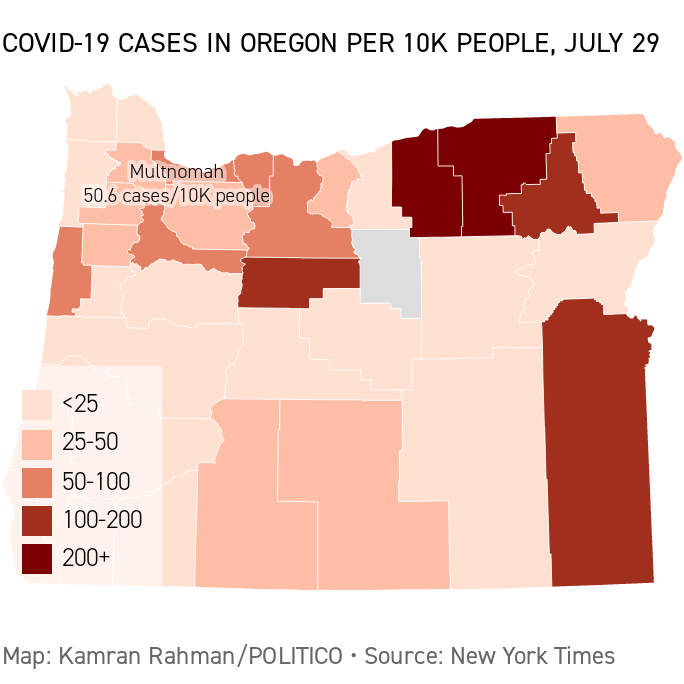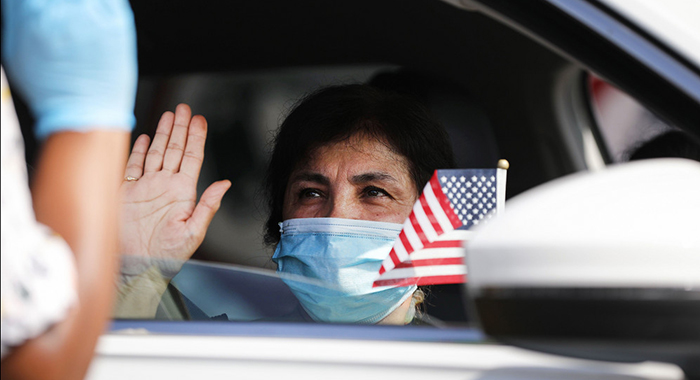
|
With help from Myah Ward
IT’S NOT OVER — Two months after the first George Floyd vigil in Portland and a month after federal teams first deployed to the city, Oregon's Democratic Gov. Kate Brown announced today that the officers would soon be leaving.
The pandemic, however, is staying.
Oregon reported 48 new Covid cases and no deaths on May 29, the day that people gathered to protest the killing of George Floyd. Today, the state reported 304 new Covid cases and 8 deaths. The total death count is now 311.

Matt Wuerker/POLITICO
Brown ordered residents in June in many parts of the state to wear face coverings indoors. Two weeks ago she required face coverings in outdoor public spaces and limited indoor gatherings to 10 people. On Tuesday she said that schools wouldn't restart in-person teaching until the state's positive test rate drops below 5 percent for three weeks.
The measures seem to be working. Case counts and deaths are growing, but Oregon is not among the worst off. Oregon is now in yellow, the “caution warranted” category, according to Covid Exit Strategy.
Yet there are outbreaks in parts of rural Oregon that previously had few cases. Malheur County, on the border of Idaho, where militia leader Ammon Bundy has been defying Covid orders, now has among the highest rates of new cases in the state.
The state’s latest Covid uptick is linked to community spread — fewer new cases are tied to large outbreaks, according to the state health department. Instead people are getting sick at smaller parties or family gatherings or exercise classes.
Portland’s progressiveness may define the state’s image, but much of Oregon is conservative. Oregon churches sued over the state’s stay-at-home order.
Covid spread in Oregon, along with the rest of the country, has been lacking one major element of the response, said Chunhuei Chi, director of the Center for Global Health at Oregon State University. The state set up a testing and contact tracing operation in May. “That’s only half of the work,” said Chi. “The other half, what we do with people who tested positive, is a complete failure.”
Oregon and other states have made no effort to properly quarantine or isolate people who have no or mild symptoms, Chi said. He estimates that this group of people can contribute to between 50 to 75 percent of new infections because they ignore orders to isolate or can’t get tested in the first place. They are told to stay at home, but there’s no monitoring or follow up. By contrast, in Taiwan, people who test positive can be fined $33,000 for violating a quarantine.
Chi said he has been talking to Oregon officials, though he wouldn’t say who. They are hesitant to impose strict quarantine requirements, he said, because many people are already opposed to even the most basic Covid requirements like masks or gathering bans.
“To this day there are still people around us who think the whole pandemic is a hoax, is fake news,” he said. “How can you enforce masks, social distance, quarantine and isolation? They will present a big challenge to our society to contain the pandemic.”

Welcome to POLITICO Nightly: Coronavirus Special Edition. Hello from my new home in El Paso, Texas! Reach out rrayasam@politico.com or on Twitter at @renurayasam.
A message from AARP:
More than 59,000 residents and staff of nursing homes and long-term care facilities have died from COVID-19. With cases continuing to spike across the country, desperate families are demanding Congress take immediate action. More lives can be saved if Congress makes sure necessary precautions are put in place. Take action
| FIRST IN NIGHTLY |
‘THE UGLIEST QUARTER WE’VE EVER SEEN’ — The U.S. economy crashed in historic fashion this year. The question now for President Donald Trump – trailing in the polls and facing a daunting reelection effort – is just how much conditions can snap back in the months leading up to Election Day, chief economic correspondent Ben White writes.
At least for the moment, the spike in Covid-19 cases, the potential for fresh trouble this fall and a bitter fight over how to pump more federal money into the ailing economy suggest the sharp bounce-back Trump is counting on may not show up in a way he envisions. And the potential for another leg of the downturn hangs over a president who once counted the economy as by far his strongest selling point to voters.
“This is obviously the ugliest quarter we’ve ever seen in our history,” Edward Moya, senior analyst at currency trading firm OANDA, said of initial second quarter gross domestic product numbers coming out Thursday morning.
Thursday also brings a fresh weekly look at initial jobless claims, which began declining from a high of 6.9 million in March but jumped back up to 1.4 million last week, the first increase in nearly four months.
The economy took a massive gut punch in the second quarter, with estimates for an annualized decline of 30 percent or more — the biggest drop on record — as restaurants, bars, stores and other businesses shut down, many for good, and many Americans remained largely shuttered in their homes.
What is far less clear is how fitful re-opening efforts, the quest for a Covid-19 vaccine, a potential second wave of the virus and the bitter debate over more federal rescue money will impact the ability of the economy to recover from this deep hole. And the answer to that question will play a substantial role in whether Trump can overcome his significant polling deficit versus former Vice President Joe Biden.
| ON THE HILL |
HOUSE CALL — Rep. Louie Gohmert, the notoriously mask averse Texas Republican, was scheduled to travel with the president to his home state today, but had to forgo the trip after he tested positive for Covid. The news has led to new Congressional Covid protocols: House Speaker Nancy Pelosi today said she’s mandating masks on the House floor.
Your host chatted with Congress reporter Sarah Ferris over Slack today about her reaction to the news, how the positive test result might shift Capitol Hill operations and whether it will influence Covid relief negotiations. This conversation has been edited.
Were you surprised that Gohmert tested positive for Covid?
The announcement this morning was definitely jarring for those of us who have been in the Capitol. Immediately, I thought of all the times I've seen him roaming the hallways without a mask and thought about how far this might have spread. It certainly puts a lot of people — members, staff, and press — on edge.
How has the news shifted the mood in the Capitol?
Many members and staff were already nervous about being in the building, so it certainly intensified those fears.
Do you think any concrete changes will come to working conditions in the Capitol? Mask enforcement? Fewer staff?
For most lawmakers, this likely reinforces their decision to keep staff at home, limit their own travel and contact with others. It’s unclear if this changes anything for Republicans like Gohmert, who were already skeptical of public health precautions.
We do know that senior Republicans and Democrats are talking about potentially requiring new steps, such as more testing for members when they return from their districts. It would be a huge lift, but it’s definitely getting renewed attention. We could even see a shift in the House GOP about their willingness to vote “by proxy” — Rep. Francis Rooney of Florida became the first Republican to cast his vote from home today, specifically citing Gohmert's positive case.
Does this change any of the dynamics of the Covid relief negotiations?
Wish I could say that another coronavirus case popping up in the halls of Congress will drive home the urgency of these negotiations. But it’s just too late. Democrats and Republicans are literally trillions of dollars apart in their plans on what to do next. The last two weeks have been squandered as Senate Republicans try to get their own members on the same page. Even White House chief of staff Mark Meadows today told reporters that there's no chance of getting a deal by the weekend — guaranteeing that unemployment aid for millions of Americans will soon dry up.
JOIN TOMORROW @ 3 p.m. EDT FOR A LIVE EPISODE OF “FOUR SQUARE ”: Where do stimulus negotiations stand? Who are insiders whispering about as the VP frontrunner for Joe Biden? How is Donald Trump’s polling affecting down-ballot races? Join POLITICO ”Four Square” host Eugene Daniels and top political journalists Tim Alberta, Laura Barrón-López, and Ryan Lizza for a deep dive into the current state of play with insider tidbits from their reporter notebooks. REGISTER HERE.
| FROM THE HEALTH DESK |
DATA ERROR — It’s been more than six months since the first case of Covid-19 was confirmed in the United States. And there is still no national standard for how a state, city or county should keep track of its spread, Nightly’s Myah Ward writes.
The result is a patchwork of data collection and reporting methods, often even within a state. “Until we have much better data, we can’t really know what the risk is in each community and how good the response is in each community,” Tom Frieden, former CDC director and president and CEO of Resolve to Save Lives, a global public health initiative, told the Nightly.
Frieden said it’s not just one datapoint that’s important. Most states publish daily case counts and deaths, but no state publishes information on test turnaround time, how quickly infected patients are isolated, or the proportion of cases diagnosed among patients who were in contact with a Covid-19 patients. Those are just some of the 15 indicators that Resolve to Save Lives says are needed to provide a full picture of the pandemic.
Frieden said if states reported all 15 indicators, “It would tell us a lot more about race and ethnicity, it would tell us about performance, it would tell us about risk, it would help drive progress.” It’s why the U.S. is falling behind on its response, he said.
“If we don’t know that information for every state, there’s not pressure to change it,” Frieden said.
Countries with a strong national data strategy, like Germany, Senegal, South Korea and Uganda, have been more successful at containing the pandemic, he said.
| AROUND THE NATION |
FLY.O.U — Americans stranded abroad as the coronavirus spread took a lifeline offered by the State Department: We'll fly you home, but you have to pay us back, transportation reporter Sam Mintz writes.
Some Americans had to use passports as collateral for loans — but months later, they're still waiting for a bill, so their passports are invalid. Others signed promissory notes agreeing to pay an eventual bill they're still waiting for, and dreading a price tag that for a family of four could weigh in at $10,000.
State has flown home about 100,000 U.S. citizens home from nearly 150 countries since the pandemic began, at a cost of $196 million to the agency, which it must collect from passengers. Of that sum, about $8 million comes from direct loans secured with a passport.
NO MORE TEACHERS? Teachers in states like Florida, Arizona and Texas are the most likely to strike in protest of unsafe working conditions in the pandemic, union leader Randi Weingarten told education reporter Juan Perez Jr today. If governors and local leaders reopen schools in places where coronavirus cases are spiking — without first containing the spread or meeting demands for safety measures — teachers can't surrender in negotiations leading up to the start of the school year, said Weingarten, who serves as president of the American Federation of Teachers.
Educators are not going to be able to teach kids "if people are scared to death," Weingarten said. “And if people die while they are educating kids, you eviscerate any credibility that you would have going forward about whether or not a school is safe.”
| PUNCHLINES |
MONOPOLY MEN — Matt Wuerker talks with former Labor secretary Robert Reich about how he’s using cartoons to explain economics these days, and how to draw an oligarch, in the latest edition of Punchlines.
| COVID-2020 |
THE BIG REVEAL — It won’t be much longer before Joe Biden reveals his running mate. As Laura Barrón-López puts it in the last edition of POLITICO Dispatch’s Veepstakes series, “This VP race is different because of the moment that we’re in.” Laura breaks down why Stacey Abrams, Susan Rice and Gretchen Whitmer are under consideration to be Biden's No. 2.
| ASK THE AUDIENCE |
Nightly asks you: Have you taken up a new hobby or activity because of the pandemic? Send a picture capturing it to nightly@politico.com and we'll include some of our favorites in our Friday edition.
| NIGHTLY NUMBER |
17
The number of House seats needed for Republicans to flip the chamber. Privately, some party strategists concede that's unlikely: as many as 20 more Republican seats are at risk of falling into Democratic hands. (h/t: Ally Mutnick)
|

A new U.S. citizen sits in a vehicle while being sworn in by an immigration service officer at a drive-in naturalization ceremony today in Santa Ana, California. U.S. Citizenship and Immigration Services temporarily suspended in-person ceremonies for nearly three months. | Mario Tama/Getty Images
| THE GLOBAL FIGHT |
EUROPE’S MASK HOLDOUT — While Europeans almost everywhere else have been required to wear masks in public places to stop the spread of the coronavirus, they're considered an annoyance in the Netherlands, Eline Schaart and Ashleigh Furlong write.
“From a medical point of view, there is no evidence of a medical effect of wearing face masks, so we decided not to impose a national obligation,” said Dutch Medical Care Minister Tamara van Ark today, after a meeting with health experts and mayors.
The meeting comes after the mayors of Amsterdam and Rotterdam called last week for a compulsory mask rule in some busy areas, following a recent rise in the number of infections in those cities.
The Dutch announcement stands in stark contrast to the growing consensus across Europe that masks should be worn in places where social distancing is difficult. Last week, Belgium announced plans to mandate face masks in more public places, and in England they have become compulsory in shops. However, in the Netherlands, masks are mandatory only on public transport.
As in many other countries around Europe, the number of coronavirus cases has been growing in the Netherlands. Over the past week, almost 1,400 new Covid-19 cases were reported, or 342 more than the week before.
BECOME A CHINA WATCHER: Across the globe, America’s allies are pushing back hard on Beijing as evidence of human rights abuses against Uighurs pile up. How should the U.S. and its allies approach the China challenge? Join the conversation and gain expert insight from informed and influential voices in government, business, law, tech, and academia. China Watcher is as much of a platform as it is a newsletter. Subscribe today.
| PARTING WORDS |
NO NEWS IS GOOD NEWS — There’s a good reason why Democrats shut Joe Biden out in 1988 and 2008 when he ran for president, and why he had the sound sense to sit out the 2016 contest, senior media writer Jack Shafer writes. He rambles. He plagiarizes. He flip-flops. Over his long career in Washington, he has become the human embodiment of the political gaffe.
The press has documented Biden’s limitations in such detail that if the presidency was a regular occupation, and Joe’s press clips were job references, his recruiter would dump his application in a waste can without even bothering to send him an insincere note wishing him luck elsewhere. But instead of hammering him and pouring vinegar on his wounds, the press has bestowed “strange new respect” status upon Biden — strange new respect being the clever trope Tom Bethell invented to describe the press corps’ sudden shift from negative to positive coverage of a politician.
That happens often. It happened to both Clintons, to Obama, even to Trump. With Biden, though, there’s a twist. In his case, “positive” coverage — the kind of wet-kiss treatment that helps a dented and flawed candidate slide right into the White House — consists primarily of ignoring him.
A message from AARP:
SENIORS DEMAND ACTION
It is an outrage that more than 59,000 residents and staff of nursing homes and other long-term care facilities have died from COVID-19. Cases are continuing to spike across the country and Congress must act now to help save lives in these facilities.
Protect nursing home residents with AARP’s five-point plan calling for:
1. Regular, ongoing testing and adequate personal protective equipment (PPE)
2. Transparency focused on daily, public reporting of cases and deaths in facilities; communication with families about discharges and transfers; and, funding accountability.
3. Access to facilitated virtual visitation.
4. Better care for residents through adequate staffing, oversight, and access to in-person formal advocates (called long-term care ombudsmen)
5. No blanket immunity to long-term care facilities related to COVID-19.
Tell Congress to act now to protect the residents and staff of nursing homes and other long-term care facilities. Take action
It is an outrage that more than 59,000 residents and staff of nursing homes and other long-term care facilities have died from COVID-19. Cases are continuing to spike across the country and Congress must act now to help save lives in these facilities.
Protect nursing home residents with AARP’s five-point plan calling for:
1. Regular, ongoing testing and adequate personal protective equipment (PPE)
2. Transparency focused on daily, public reporting of cases and deaths in facilities; communication with families about discharges and transfers; and, funding accountability.
3. Access to facilitated virtual visitation.
4. Better care for residents through adequate staffing, oversight, and access to in-person formal advocates (called long-term care ombudsmen)
5. No blanket immunity to long-term care facilities related to COVID-19.
Tell Congress to act now to protect the residents and staff of nursing homes and other long-term care facilities. Take action
Did someone forward this email to you? Sign up here.
Follow us on Twitter
Renuka Rayasam @renurayasam
|
FOLLOW US
|




No comments:
Post a Comment
Note: Only a member of this blog may post a comment.